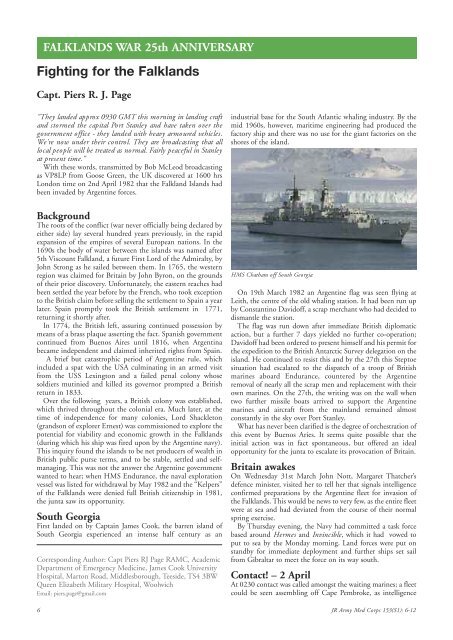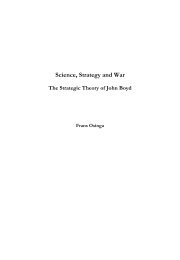Falklands war 25TH anniversarY - Boekje Pienter
Falklands war 25TH anniversarY - Boekje Pienter
Falklands war 25TH anniversarY - Boekje Pienter
You also want an ePaper? Increase the reach of your titles
YUMPU automatically turns print PDFs into web optimized ePapers that Google loves.
FALKLANDS WAR 25th ANNIVERSARY<br />
Fighting for the <strong>Falklands</strong><br />
Capt. Piers R. J. Page<br />
"They landed approx 0930 GMT this morning in landing craft<br />
and stormed the capital Port Stanley and have taken over the<br />
government office - they landed with heavy armoured vehicles.<br />
We're now under their control. They are broadcasting that all<br />
local people will be treated as normal. Fairly peaceful in Stanley<br />
at present time."<br />
With these words, transmitted by Bob McLeod broadcasting<br />
as VP8LP from Goose Green, the UK discovered at 1600 hrs<br />
London time on 2nd April 1982 that the Falkland Islands had<br />
been invaded by Argentine forces.<br />
industrial base for the South Atlantic whaling industry. By the<br />
mid 1960s, however, maritime engineering had produced the<br />
factory ship and there was no use for the giant factories on the<br />
shores of the island.<br />
Background<br />
The roots of the conflict (<strong>war</strong> never officially being declared by<br />
either side) lay several hundred years previously, in the rapid<br />
expansion of the empires of several European nations. In the<br />
1690s the body of water between the islands was named after<br />
5th Viscount Falkland, a future First Lord of the Admiralty, by<br />
John Strong as he sailed between them. In 1765, the western<br />
region was claimed for Britain by John Byron, on the grounds<br />
of their prior discovery. Unfortunately, the eastern reaches had<br />
been settled the year before by the French, who took exception<br />
to the British claim before selling the settlement to Spain a year<br />
later. Spain promptly took the British settlement in 1771,<br />
returning it shortly after.<br />
In 1774, the British left, assuring continued possession by<br />
means of a brass plaque asserting the fact. Spanish government<br />
continued from Buenos Aires until 1816, when Argentina<br />
became independent and claimed inherited rights from Spain.<br />
A brief but catastrophic period of Argentine rule, which<br />
included a spat with the USA culminating in an armed visit<br />
from the USS Lexington and a failed penal colony whose<br />
soldiers mutinied and killed its governor prompted a British<br />
return in 1833.<br />
Over the following years, a British colony was established,<br />
which thrived throughout the colonial era. Much later, at the<br />
time of independence for many colonies, Lord Shackleton<br />
(grandson of explorer Ernest) was commissioned to explore the<br />
potential for viability and economic growth in the <strong>Falklands</strong><br />
(during which his ship was fired upon by the Argentine navy).<br />
This inquiry found the islands to be net producers of wealth in<br />
British public purse terms, and to be stable, settled and selfmanaging.<br />
This was not the answer the Argentine government<br />
wanted to hear; when HMS Endurance, the naval exploration<br />
vessel was listed for withdrawal by May 1982 and the “Kelpers”<br />
of the <strong>Falklands</strong> were denied full British citizenship in 1981,<br />
the junta saw its opportunity.<br />
South Georgia<br />
First landed on by Captain James Cook, the barren island of<br />
South Georgia experienced an intense half century as an<br />
Corresponding Author: Capt Piers RJ Page RAMC, Academic<br />
Department of Emergency Medicine, James Cook University<br />
Hospital, Marton Road, Middlesborough, Teeside, TS4 3BW<br />
Queen Elizabeth Military Hospital, Woolwich<br />
Email: piers.page@gmail.com<br />
HMS Chatham off South Georgia<br />
On 19th March 1982 an Argentine flag was seen flying at<br />
Leith, the centre of the old whaling station. It had been run up<br />
by Constantino Davidoff, a scrap merchant who had decided to<br />
dismantle the station.<br />
The flag was run down after immediate British diplomatic<br />
action, but a further 7 days yielded no further co-operation;<br />
Davidoff had been ordered to present himself and his permit for<br />
the expedition to the British Antarctic Survey delegation on the<br />
island. He continued to resist this and by the 27th this Steptoe<br />
situation had escalated to the dispatch of a troop of British<br />
marines aboard Endurance, countered by the Argentine<br />
removal of nearly all the scrap men and replacement with their<br />
own marines. On the 27th, the writing was on the wall when<br />
two further missile boats arrived to support the Argentine<br />
marines and aircraft from the mainland remained almost<br />
constantly in the sky over Port Stanley.<br />
What has never been clarified is the degree of orchestration of<br />
this event by Buenos Aries. It seems quite possible that the<br />
initial action was in fact spontaneous, but offered an ideal<br />
opportunity for the junta to escalate its provocation of Britain.<br />
Britain awakes<br />
On Wednesday 31st March John Nott, Margaret Thatcher’s<br />
defence minister, visited her to tell her that signals intelligence<br />
confirmed preparations by the Argentine fleet for invasion of<br />
the <strong>Falklands</strong>. This would be news to very few, as the entire fleet<br />
were at sea and had deviated from the course of their normal<br />
spring exercise.<br />
By Thursday evening, the Navy had committed a task force<br />
based around Hermes and Invincible, which it had vowed to<br />
put to sea by the Monday morning. Land forces were put on<br />
standby for immediate deployment and further ships set sail<br />
from Gibraltar to meet the force on its way south.<br />
Contact! – 2 April<br />
At 0230 contact was called amongst the waiting marines; a fleet<br />
could be seen assembling off Cape Pembroke, as intelligence<br />
6 JR Army Med Corps 153(S1): 6-12

















